
DJ Acid Maria, born Angelika Lepper, is a German DJ and music producer of electronic music. Her musical style is between techno and Chicago house. She became famous as the house DJ of the Munich clubs Ultraschall and Harry Klein. [1] [2]

DJ Acid Maria, born Angelika Lepper, is a German DJ and music producer of electronic music. Her musical style is between techno and Chicago house. She became famous as the house DJ of the Munich clubs Ultraschall and Harry Klein. [1] [2]
Her career began on December 6, 1992, when she performed for twenty people for "Jockey Slut Night" at Club Alcatraz in Munich. [3]
In the Munich scene she was next known as a co-owner of a store that sold clubwear clothing. [4]
Acid Maria was the first house DJ of Munich's first techno club Ultraschall since its establishment. [5] She performed and produced projects for DJ Hell's International DeeJay Gigolo Records label, founded in 1996. She was later house DJ for the Munich club Harry Klein, the Berlin club WMF and the club event Killekill, as well as the Cologne club Subway.
In between these roles, she toured worldwide, playing at "Festival Tecnogeist 2000" in Mexico City, the Womb Club in Tokyo and Mayday in Dortmund. [6] [7] [8]
She has worked with and produced albums with Steve Bug, Markus Güntner, the Teichman Brothers, and Abe Duque.
She studied Media Arts and Philosophy and Aesthetics at the Karlsruhe University of Arts and Design. [3] Between 2004 and 2014, she taught at various universities in Berlin, including at Konrad Wolf Film University of Babelsberg in Potsdam and Bauhaus-Universität Weimar in Weimar. [9] [3]
She is a founding member of the international network female:pressure, an organization for female, transgender and non-binary artists in electronic music. [10] [3] With Electric Indigo she mixed Female Pressure Presents: Welttour [World Tour] in 2003. [11]
House is a genre of electronic dance music characterized by a repetitive four-on-the-floor beat and a typical tempo of 115–130 beats per minute. It was created by DJs and music producers from Chicago's underground club culture and evolved slowly in the early/mid 1980s as DJs began altering disco songs to give them a more mechanical beat. By early 1988, house became mainstream and supplanted the typical 80s music beat.

A rave is a dance party at a warehouse, club, or other public or private venue, typically featuring performances by DJs playing electronic dance music. The style is most associated with the early 1990s dance music scene when DJs played at illegal events in musical styles dominated by electronic dance music from a wide range of sub-genres, including drum and bass, dubstep, trap, break, happy hardcore, trance, techno, hardcore, house, and alternative dance. Occasionally live musicians have been known to perform at raves, in addition to other types of performance artists such as go-go dancers and fire dancers. The music is amplified with a large, powerful sound reinforcement system, typically with large subwoofers to produce a deep bass sound. The music is often accompanied by laser light shows, projected coloured images, visual effects and fog machines.

Electroclash is a genre of popular music that fuses 1980s electro, new wave and synth-pop with 1990s techno, retro-style electropop and electronic dance music. It emerged in the late 1990s and was pioneered by and associated with acts such as I-F, DJ Hell, Miss Kittin and The Hacker, and Fischerspooner.
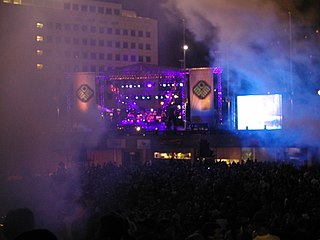
Movement Electronic Music Festival is an annual electronic dance music event held in the birthplace of Techno, Detroit, each Memorial Day weekend since 2006. Previous electronic music festivals held at Hart Plaza on Memorial Day weekend include Detroit Electronic Music Festival (2000–2002), Movement (2003–2004) and Fuse-In (2005). The four different festival names reflect completely separate and distinct producers, brands and directions. All of these festivals presented performances by musicians and DJs that emphasized the progressive qualities of the culture surrounding electronic music including the celebration of Detroit being the birthplace of the popular electronic music subgenre Techno.
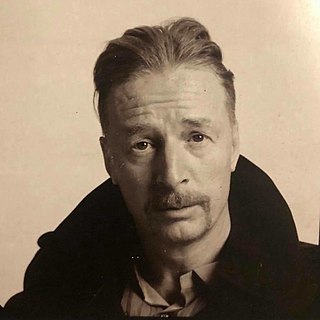
Helmut Josef Geier, known professionally as DJ Hell, is a German DJ.
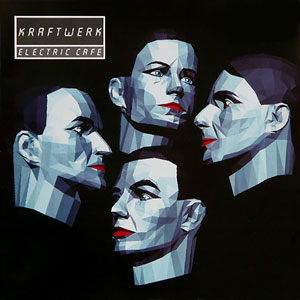
Electric Café is the ninth studio album by German electronic band Kraftwerk, released on 27 October 1986. The initial 1986 release came in versions sung in English and German, as well as a limited Edición Española release, featuring versions of "Techno Pop" and "Sex Object" with only Spanish lyrics. It was the first Kraftwerk LP to be created using predominantly digital musical instruments, although the finished product was still recorded onto analog master tapes.
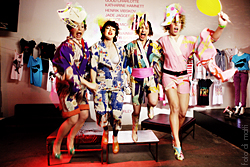
Chicks on Speed is a feminist music and fine art ensemble, formed in Munich in 1997 at the Munich Academy of Fine Arts. Though Chicks on Speed reached cult status throughout the 2000s and became most well known as catalysts of the musical genre electroclash, the band performs as a multidisciplinary art group working in performance art, electronic dance music, collage graphics, textile design, fashion, musical instrument design, Artistic Research and education.

Kevin Richard Martin, often known under his recording alias The Bug, is an English musician and music producer. Martin moved from Weymouth to London around 1990 and is now currently based in mainland Europe. He has been active for over three decades in the genres of dub, jazzcore, industrial hip hop, dancehall, and dubstep.
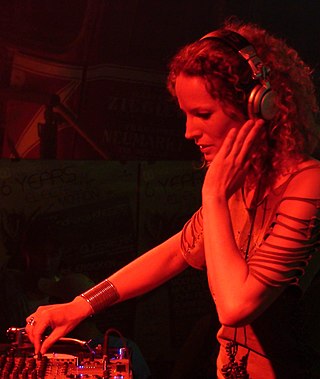
Monika Kruse is a German techno DJ/producer and record label owner, with a career in electronic music spanning more than 25 years. She played an influential role in the early Munich rave scene during the early 1990s and was among the first wave of German techno artists to tour internationally, before moving to Berlin at the end of the decade where she founded her Terminal M record label.
Techno is a genre of electronic dance music which is generally produced for use in a continuous DJ set, with tempos being in the range from 120 to 150 beatrates per minute (bpm). The central rhythm is typically in common time and often characterized by a repetitive four on the floor beat. Artists may use electronic instruments such as drum machines, sequencers, and synthesizers, as well as digital audio workstations. Drum machines from the 1980s such as Roland's Roland TR-808 and Roland TR-909 are highly prized, and software emulations of such retro instruments are popular in this style.

Susanne Kirchmayr aka Electric Indigo is an Austrian music producer, Techno DJ and feminist who performs under the name Electric Indigo. Her stage name is a combined reference to her favorite color indigo and her affinity for electronic music.

Monique Fessl is an Austrian music producer, composer, Techno – DJ, singer and media artist.
female:pressure is an international network of female, transgender and non-binary artists in the fields of electronic music and digital arts founded by Electric Indigo in 1998 : from musicians, composers and DJs to visual artists, cultural workers and researchers. A worldwide resource of talent that can be searched after criteria like location, profession, style or name. "Why are there so few women active in the electronic music scene?" - each one of us has heard this question a thousand times... Here is the answer: It's not our number, it's about how and if we are recognized!
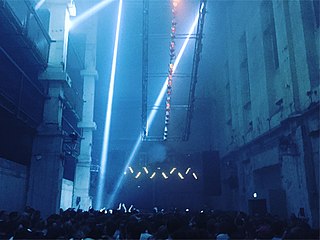
MMA Club(Mixed Munich Arts Club) was a techno nightclub in Munich, Germany, renowned as one of the best in Germany in the 2010s. It was a multifaceted establishment based inside the husk of an old thermal power plant and has hosted underground techno DJs such as Richie Hawtin, Adam Beyer, Len Faki, Ben Klock, Marcel Dettmann, Ben Sims or Terence Fixmer, among many others. The maze-like club also contained a 460-square-meter gallery space frequently utilized for a variety of theatrical, artistic and orchestral performances.

Ultraschall was a nightclub in Munich, Germany from 1994 to 2003. The techno club belonged, besides the Tresor and E-Werk in Berlin, the Dorian Gray and Omen in Frankfurt, and the Munich-based clubs KW – Das Heizkraftwerk, Natraj Temple and Millennium, to the most renowned clubs of Germany's 1990s techno culture. According to FazeMag, Ultraschall was "for many techno fans the most authentic techno club alongside the Tresor".

KW – Das Heizkraftwerk was a nightclub in Munich, Germany from 1996 to 2003. The techno club belonged, besides the Tresor and E-Werk in Berlin, the Dorian Gray and Omen in Frankfurt, and the Munich-based clubs Ultraschall, Natraj Temple and Millennium, to the most renowned clubs of Germany's 1990s techno culture.

Blitz Club is a techno nightclub in the Munich district of Ludwigsvorstadt-Isarvorstadt.

Natraj Temple [] was a nightclub in Munich, Germany from 1996 to 2008. Germany's first steady psytrance nightclub belonged, besides the Tresor and E-Werk in Berlin, the Dorian Gray and Omen in Frankfurt, and the Munich-based clubs Ultraschall, KW – Das Heizkraftwerk and Millennium, to the most renowned clubs of Germany's 1990s techno culture, and was considered an international centre of the Goa trance movement.
Babalu Club was one of the most well-known nightclubs of the early German techno scene and was located in Munich's Schwabing district from 1990 to 1994.